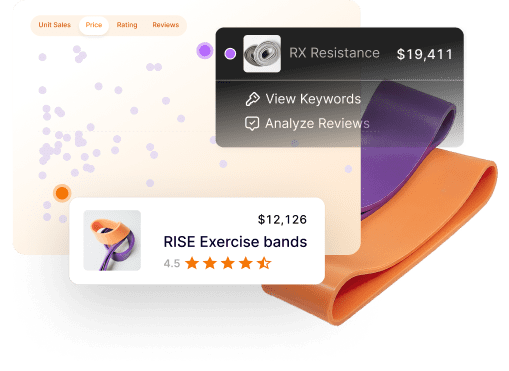Prime Day offers Amazon sellers the classic good news bad news proposition – you score some huge sales several months prior to Q4 starting, and you get a wonderful chance to boost brand recognition for the rest of the year.
The bad news, of course, is that with an uptick in sales activity comes additional risk, whether it’s from illicit maneuvers by competitors that negatively impact you or from automation errors just before the main event.
Either way, Prime Day motivates you to get your houses in order to make sure that you don’t have any listing violations or unresolved item quality complaints in Account Health, which could trip you up. Additionally, it helps brand owners understand potential threats to their business.
Based on the information we have from last July, about one in five contacts we receive from brand owners just before or during Prime Day involve sudden listing takedowns. Another one in six or so clients receive messaging right around that time that suggests that they may lose the account if they cannot appeal their performance or policy compliance shortcomings to Amazon’s satisfaction. That means you, as the account owner, need to be vigilant and ready for anything.
Be prepared for anything
Since Prime Day is such a high-stakes event, being prepared for different types of issues is crucial. Every brand needs to have operational “rapid response teams” who will be ready and able to tackle ASIN detail page changes or listing takedowns immediately.
A plan that anticipates problems will help you identify causes, implement solutions, and draft appeals to help you communicate effectively with Amazon. If you stay proactive and invest in protecting your account, competitors or black hat sellers are much less likely to bother trying to take you down.
What last-minute tips can we offer? I’ll focus on three main points for sellers to keep an eye on during Prime Day.

Monitor listings and prepare for abusive, illicit changes by other parties
Skipping on essential monitoring tools to save costs can backfire, costing you more in the long run. Be the seller who’s prepared for all outcomes, whether it’s Amazon listing errors, competitor attacks, or automation mistakes. Don’t be the seller who delays this prep, hoping listing changes or ASIN takedowns don’t happen to you.
Amazon bots, AI, or other sellers could alter your listings without your knowledge, potentially damaging your sales and reputation. Setting up listing alerts with reliable tools ensures you can act quickly against hijackers or abusive contributions that might violate Amazon’s policies. Addressing these changes promptly can prevent ASIN restrictions and sales rank losses.

Alerts available with the Growth Accelerator and Brand Owner Jungle Scout plans
Don’t waste time compiling documents you could have already had in place prior to the big event. Be ready to submit them and attach a short appeal stating you’ve provided all info as requested, with plans to appeal via email directly to senior management if it’s ignored.
For example, Amazon expects you to have all safety or testing documentation prepared and organized for their review, depending on what kinds of products you sell. If you have to scramble to put together information about your supplier or manufacturer, Amazon’s compliance teams won’t take you too seriously. Be able to answer questions like:
- How long have you worked with your current supplier or manufacturer?
- Do they have a professional-looking website, and do they look like an established business or manufacturer of the products you sell? Are there visible examples of your product or similar items on their website for easy verification purposes?
- If Amazon calls them to verify info about working with you, will they answer? Do you have a solid contact for them to call or email when verifying your supplier relationship?
Understand that Prime Day automatically increases the amount of anti-competitive behavior
Whenever there’s more cash on the line, consider that many sellers and black hat services will come after successful products even more than usual. Identify the strategies likely to be used now, not after they happen, and be ready for them! If you prepare, you’ll be ready to counter any safety or counterfeit complaint that comes your way.
Many continue to buy from competitors in order to submit fake negative reviews that cite health hazards, injuries, difficult-to-use, or cheap or fake products that result in a terrible buyer experience.
They’re trying to trigger an automated script that runs on the Amazon side to capture all of these ugly words and create an investigation for policy teams to comb through.
They understand that Amazon’s investigation teams react to automated flags or keywords by taking a quick run through buyer comments and past problems on that particular ASIN (which could easily have originated from the same abusive seller), then suspending the listing immediately.

Lots of sellers and black hat services know you’ll eventually get the listing back but they need to keep you down for Prime Day to score more sales of their own competitor products.
Don’t let them win! Follow these tips and prepare BEFORE anything ugly happens.
Let’s say you do your research and due diligence into a spike in actual customer complaints. Have Plan of Action-style language ready to go to cover any surprise item condition or item quality complaints.
Be ready to explain the “root causes” that you’d expect to receive in a fake attack, which could mean anything around unsafe items (personal injury, health problems, problems from misusing a poorly described product, for example) or fake counterfeit claims, even if you’re the manufacturer of your own products. It’s possible! You can always edit later.
Amazon tends to send slow or no response, especially during peak periods
Don’t let Amazon teams get away with avoiding you! When they’re swamped, especially during peak sales periods, they will ignore you if you let them. Amazon likes to say how much sellers like the marketplace experience, and they’re building up seller-side teams for a reason.
In reality, they understand that relations with sellers aren’t so wonderful these days (despite what Andy Jassy recently said). It’s a mistake to just sit back and wait. Be proactive! Follow up, too.

Here’s what you can do about it.
1. Get Account Health reps on the case for you
Get them to give you real answers, denial notes, or rejection reasons. Otherwise, the calls to them don’t have any real value.
2. Got paid SAS core reps in your corner?
Make sure you call them and keep an active email thread. They can create internal escalations if you get a copy and paste denial from support or Seller Performance or if Account Health reps are clueless and not helping you. It’s true that your rep may not be able to push through internal escalations quickly, especially during Prime Day. But the good news is that you can reference that in your own external escalations and pressure Amazon from both sides. Often, this one-two punch moves things along faster!
3. Get familiar with emails to senior management-level Amazonians
Ask them to conduct an actual review or to have one of their direct report managers do something more thorough, comprehensive, and accurate. You can’t waste Prime Day simply trying to be heard, and waiting around. Anyone who has any authority at Amazon, or more than a few years in, knows this and should certainly appreciate it.
By escalating to abuse teams, brand registry, Jeff and other policy managers all at once, you’re increasing the chance that Amazon takes real action to help you. If you try some of these or commit some of these mistakes and anything goes sideways on you, we’re happy to help!
Former Amazonian Chris McCabe helps sellers communicate with Amazon to protect (and save) their businesses. After working for Amazon for many years evaluating seller account performance and enforcing Amazon’s policies, Chris launched ecommerceChris. He teaches sellers how to think like Amazon, and helps them protect their accounts, appeal listing restrictions and suspensions, report abuse, and escalate seller issues.











One comment on “How Amazon Sellers Can Avoid Listing Violations & Quality Complaints on Prime Day”